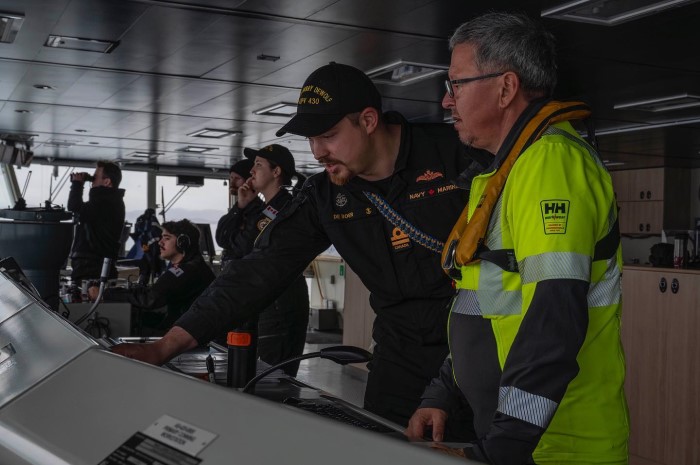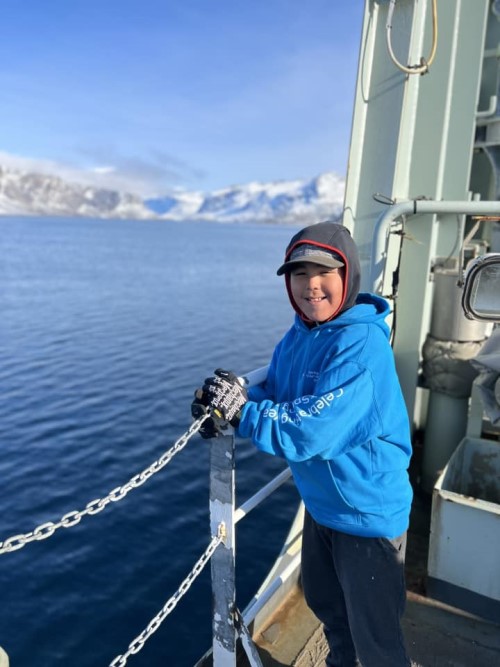The Arctic and Offshore Patrol Vessel: a valuable asset in protecting Canada’s Northern waters
September 4, 2023 - Royal Canadian Navy

Caption
HMCS Harry DeWolf recently took a quick scenic pit stop in Nuuk, Greenland to take on supplies and let the crew stretch their legs.

Caption
HMCS Harry DeWolf visited with students from Attagoyuk Ilisavik High School at Pangnirtung Fiord.

Caption
HMCS Harry DeWolf recently took a quick scenic pit stop in Nuuk, Greenland to take on supplies and let the crew stretch their legs.

Caption
HMCS Harry DeWolf visited with students from Attagoyuk Ilisavik High School at Pangnirtung Fiord.
In Canada’s North, Arctic Offshore and Patrol Vessels (AOPVs) provide increasing value to the Royal Canadian Navy (RCN) and our nation. The vessels provide the opportunity for our navy to become familiar with the unique Arctic environment, reinforce relationships with local communities, and demonstrate Canada’s presence in the region.
The Arctic strategic and operational environment is rapidly evolving due to climate change, technological advancements and strategic competition by nations also hoping to assert sovereignty in the region. The North is becoming increasingly accessible and human activity, at sea and ashore, is on the rise. The transformation of the Arctic environment creates both opportunities and challenges for Canada’s security and prosperity.
To succeed in this changing complex security environment, the Canadian Armed Forces (CAF) has increased its presence in the Arctic. Over the long term, the CAF will continue to employ a series of programs, working cooperatively with Indigenous communities, as well as domestic and international partners.
“The response so far has been very positive,” said Lieutenant-Commander (LCdr) Jim Little, Senior Staff Officer, Operations, Readiness and Air Capabilities, New Capability Integration. “The RCN will continue to operate in the Arctic for the foreseeable future. Our sailors, aviators and soldiers have enjoyed working with our partners that regularly operate in the North.”
Our navy plays a crucial role in achieving the goal of increased presence and strong relationships with Northern communities, given the importance of the maritime environment in the Canadian Arctic.
With the acquisition of our six ice-capable Harry DeWolf-class AOPVs, three of which have already been delivered, and the fourth being delivered end of August, we’re increasing our range, endurance, and effectiveness throughout the area.
AOPVs are designed to operate in ice up to 1.5 metres thick, permitting operations from late spring to late fall. This will allow the RCN to have unescorted access to areas of the Arctic that were previously unreachable.
These operations in the North support Canada’s defence policy: Strong, Secure, Engaged, through the conduct of search and rescue when required, assistance to other government departments, and participation in research and scientific studies.
“AOPVs are able to capture various meteorological and ocean data related to the Arctic Ocean and the overall environment,” explained LCdr Little. “This will increase the CAF’s knowledge of the Arctic, the challenges posed to its residents and the overall marine environment.”
With their considerable space to transport cargo and the capacity to embark a Cyclone helicopter, small vehicles, and deployable boats, AOPVs have the capacity to facilitate helicopter operations and landing craft support, provide storage and transport, and command and control capabilities.
Given the significant range of AOPVs, each ship is capable of spending extended periods of time in the North through the summer months, ensuring Canadian sovereignty by conducting patrols and surveillance of Arctic waters.
By participating in northern operations such as Op Nanook in support of Canadian Joint Operations Command and other government departments, AOPVs conduct visits to remote villages and hamlets to increase awareness of the RCN and CAF’s presence in the North.
Each of the six AOPVs will be affiliated with the Inuit Nunangat regions of the Arctic to deepen ties. His Majesty’s Canadian Ship (HMCS) Harry DeWolf established an affiliation with the Qikiqtani Inuit Association, Margaret Brooke is affiliated with Nunatsiatvut, Labrador and Max Bernays will formalize its affiliation with the Kitkmeot region in November 2023.
Building these relationships increases the RCN’s understanding of the Inuit culture, provides transparency of our northern operations with local communities, and allows the ship’s crew to connect and learn from local communities.
“We have learned a lot through participation in operations such as Nanook, and collaboration with our partners, including the Canadian Rangers and other federal, territorial and local governments, has been exceptional,” said LCdr Little.
Our navy’s participation in Operation Nanook and the increased knowledge of Arctic operations is enabled by each ship’s affiliation with their region. This offers the sailors an increased awareness and understanding of Indigenous and Inuit peoples of the Inuit Nunangat, and the chance to learn from each other.
The opportunity to sail so far North increases sailors experience with ice operations. The Canadian Coast Guard and local communities have been especially helpful in increasing RCN expertise with such unique scenarios, says LCdr Little.
AOPVs are scheduled to deploy on an annual basis for Nanook but may also proceed north to conduct surveillance operations or to operate in or near the ice shelf outside of the navigable season.
We received our first AOPV, HMCS Harry DeWolf on July 31, 2020. It was commissioned into service in June of 2021 and completed its first operational tour – the circumnavigation of North America – between August and December 2021, which included a transit through the Northwest Passage.
Our second AOPV, HMCS Margaret Brooke, was delivered on July 15, 2021, and our third AOPV, HMCS Max Bernays, was delivered on September 2, 2022. The fourth AOPV, HMCS William Hall is scheduled to be (was) delivered on August 31. The final two ships are currently in various stages of production.
As the Arctic environment continues to experience significant change, every AOPV represents an innovative and important capability for the RCN.
Page details
- Date modified: